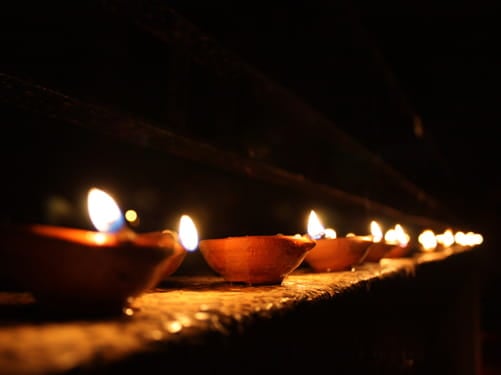No such thing as 'breakfast' in India...
But yes, it is quite a wonder - this 'breakfast' menu in India. In fact, from ancient times, there has been no such thing as 'break-fast' in India. No such concept existed because the average Indian doesn't think that by consuming food in the morning he/she is "breaking the fasting period" of the previous night, as the term 'breakfast' suggests.
There is 'Naashta' that is eaten in the Indian household including the ones who live overseas and like many things Indian; the 'naashta' echoes the diversity of the country. In fact, the Indian Naashta varies quite a bit from region to region be it from Kutch in the West to Kolkatta in the East; Srinagar in the North to Suchindram in the South. Normally naashta is based on wheat or rice with vegetables as the accompaniment.
However, when you step out of India or even in urban India today, the naashta is increasingly influenced by what I call as 'commercial breakfast'. The urban Indians and the ones living overseas simply follow the crowd by consuming convenient foods, supermarket dependent where boxed cereals, cold reconstituted fruit juice or coffee-in-a-hurry is the norm.
The variety in Indian breakfast...
The authentic Indian breakfast is made from ingredients that are available regionally and even seasonally. The naashta is always fresh and cooked (made from scratch) - be it Idlis, Pongal, Vada, Dosa, Upama etc in the South, or stuffed paratha in the North. In central states like Maharashtra, Potato Poha, Upma, or Shira is the ultimate and tasty breakfast. Gujarati breakfast items are the famous haandvo, dhokla, sev-khamni, theplas, bhaakhri etc. Masala tea is quite common or even filter coffeee if you are from south. Children are always given milk, sometimes with powdered almonds, cardomam, cinnamon and/or saffron.
You are what you digest...
The traditional breakfast has a strong Hindu influence. To be precise it is based on principles mentioned in that part of the Vedic literature that deals with 'Ayuh'...life. There are some cardinal rules in Indian breakfast. Here they are: Authentic Indian breakfast is freshly cooked (cooked from scratch), almost always vegetarian, served warm, generally savory, spiced moderately and in small portions. There is a reason for this model and the credit goes to good old Ayurveda - the science of healthy life. Ayurveda is a 'Upa-Veda' meaning a branch of the Vedic knowledge that deals with medicine and lifestyle. There is no such thing as an ideal homogenous Indian breakfast as the authentic Indian food is highly individualized based on Ayurveda.
Ayurveda says that eating and digestion sustains life. Without food input body cannot get the right energy to survive. Ayurveda emphatically says, “YOU ARE WHAT YOU DIGEST AND NOT WHAT YOU EAT”. So basically Ayurveda says - what's the point of eating wonderfully nutritious food when you can't digest it properly and absorb the nourishment.
The funda behind authentic Indian breakfast...
Ayurvedic lifestyle and Ayurvedic cooking are gaining tremendous popularity today. Our modern world that thrashes anything unscientific seems to slowly understand the science in Ayurveda. The funda behind cooked Indian breakfast is about following a natural order of things we see around. The Indian naashta follows the principle of 'agni' i.e. the fire element in digestion, as expounded in the Ayurveda texts. Agni is the digestive and absorption process called as Pakwagni (digestive fire) that drives all digestion and metabolism in our bodies. So if the breakfast doesn't kindle the digestive fire, it is not that good for the body. Spice is added to gently stoke the Agni.
Nora Isaacs, a popular health journalist from the U.S.A remarks, "At the start of the day, sometime between 6:00 and 10:00 a.m., Agni is quite low, and it's not easy for most bodies to digest a big breakfast." So this means, the inner Agni follows the path of the sun. The highest Agni happens when the sun is on top by afternoon. That's when the body is ready for a heavy lunch.
In the book "Ancient Wisdom for Modern Health", Mark Bunn, a former AFL footballer turned Natural Health Guy, trained as both an exercise physiologist (Western Science) and in natural, Eastern health-care (Maharishi Ayurveda) expands this logic and writes, "Unlike modern health directives, in Ayurveda and other time-tested natural health sciences, breakfast is not recommended to be a large meal, let alone the most substantial meal of the day. In long-living groups such as the Okinawans, Vilcabambans, Campodimelani and Abkhasians, none have breakfast as the most important or substantial meal of the day. They have understood that the time when the sun reaches its peak is when we are best equipped to eat more."
The world famous Ayurvedic physician Vasant Lad is oft quoted by Ayurvedic practitioners thus: "If Agni is healthy; you have tremendous energy throughout the day. But if Agni is not healthy, you cannot go so fast. The energy is Agni, and Agni is energy."
Thus influenced by Ayurveda, the Indian breakfast "Naashta" is more of a warm-up for the body. Eating warm, fresh, well-spiced, easy-to-digest vegetarian foods is the Indian naashta trademark. The case for the good old naashta seems to be strong but before embarking on the naashta journey consulting a qualified Ayurvedic physician would be wise.
Ram Lingam blogs his insights on India and Indian culture at www.indiasutra.co.nz

